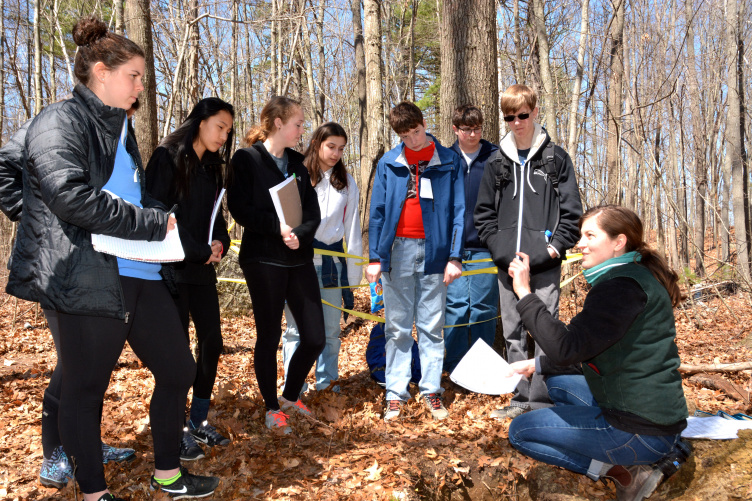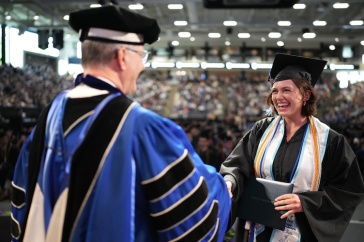
Andrea Jilling
Program/Department: Earth & Environmental Science
Andrea Jilling studied botany at McGill University and worked on a series of farms – first, at a rooftop greenhouse in Montreal, and then at a vegetable farm in southwestern New Hampshire – before starting her Ph.D. at UNH.
Her research looks into the ways we define and measure soil fertility. She is interested in how plants and microbes (microscopic organisms) work together to release nutrients that are otherwise not immediately availability to plants.
“Microbes can transform soil organic matter into a form plants can use, but it is challenging to predict when, how, and where this transformation takes place,” she said.
Jilling hopes her research will improve our ability to measure soil nutrient supply and help reduce our reliance on fertilizers. After UNH, she would like to build a program bridging fundamental and applied research on soil-plant-microbe interactions to benefit current and future sustainable agricultural systems.
She’s grateful to the Graduate School for the recognition and the time, mental space and financial support the Dissertation Year Fellowship provides so she can commit wholeheartedly to the final stages of her research and writing. She plans to graduate May 2019.
Jin Lee
Program/Department: English
Jin Lee’s dissertation focuses on 20th and 21st century Asian American novels and graphic narratives in view of trauma theory, comics theory and world literature.
She’s particularly interested in writers and characters who reference historical trauma in relation to tales and people real or imagined, from Fa Mu Lan to Godzilla.
“As scholars note, history inherently has blind spots. Written by the victors of major global conflicts, historical narratives are often silent about the oppressed. However, literary and graphic arts can effectively give voice to the voiceless and offer insight into unremarked histories,” she said. “Characters or authors in the texts I chose for my dissertation use these disembodied voices or images as a common language for them to articulate their own trauma.”
Her research examines texts such as Maxine Hong Kingston’s The Woman Warrior, Lois-Ann Yanamaka's Blu's Hanging, GB Tran's Vietnamerica, Gene Luen Yang's American Born Chinese and Fred Chao's Johnny Hiro. Lee said she has always been interested in social justice, and her hope is that the silenced stories of minorities are heard with empathy.
Lee, originally from South Korea, earned her bachelor’s degree in English Literature at Ewha Womans University and a master’s at Clark University. She worked for a couple years before entering UNH’s English program. She plans to graduate May 2019 and, afterward, become a professor at a research university.
Mark Anthony
Program/Department: Natural Resources & Environmental Study
Mark Anthony’s research looks at how global change stressors influence soil microorganisms and fungal communities. His focus: climate change, invasive species and nitrogen deposition.
It’s an important topic, he said, as fungi are critical to the ecology and evolution of plants.
“Fungi form underground symbioses with 75 percent of plants, and this symbiosis evolved and continues to change,” Anthony said.
Much of his work tackles applied dimensions of fungal ecology, specifically, invasive plants that can suppress fungi, and the efficacy of removing such plants to restore fungal communities. His work also explores more fundamental aspects of fungal ecology, including factors influencing fungal biodiversity and evolutionary processes that might discourage plant-fungal interactions.
The goal is to illustrate how symbiotic fungi are vulnerable to global change and how changes in the fungal community are linked to plant and soil health.
Anthony earned a bachelor’s degree at Hampshire College and a master’s at UNH, after which he moved to Iowa to research crop production for biofuels. The past three years, his work was funded by National Science Foundation Graduate Research Fellowships.
He plans to graduate May 2019. Afterward, he’d like to work in academia, doing research and teaching in an interdisciplinary department that makes greater connections between environmental sciences and social justice.
-
Written By:
Kristen Melamed | Graduate Admissions
















































